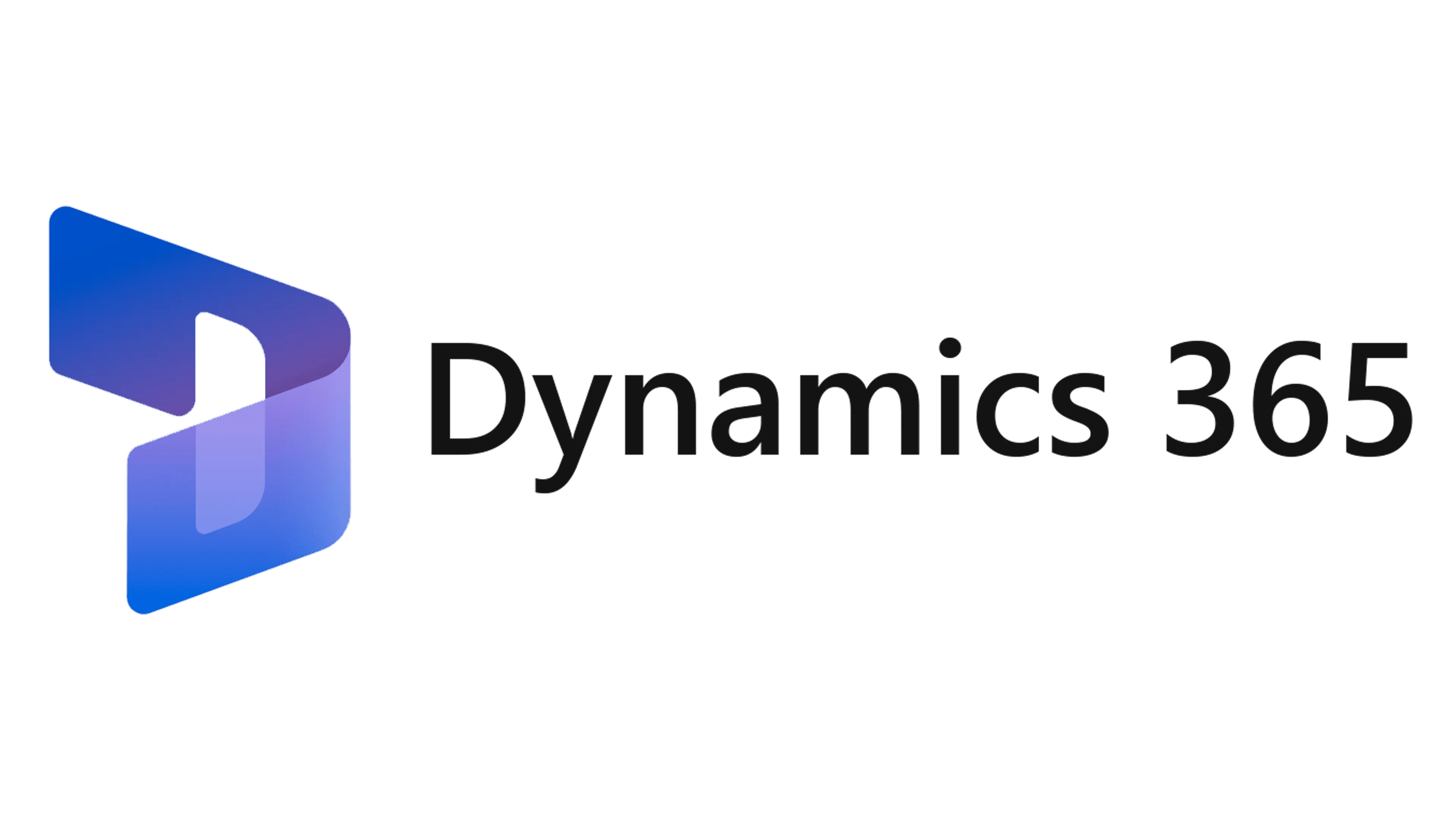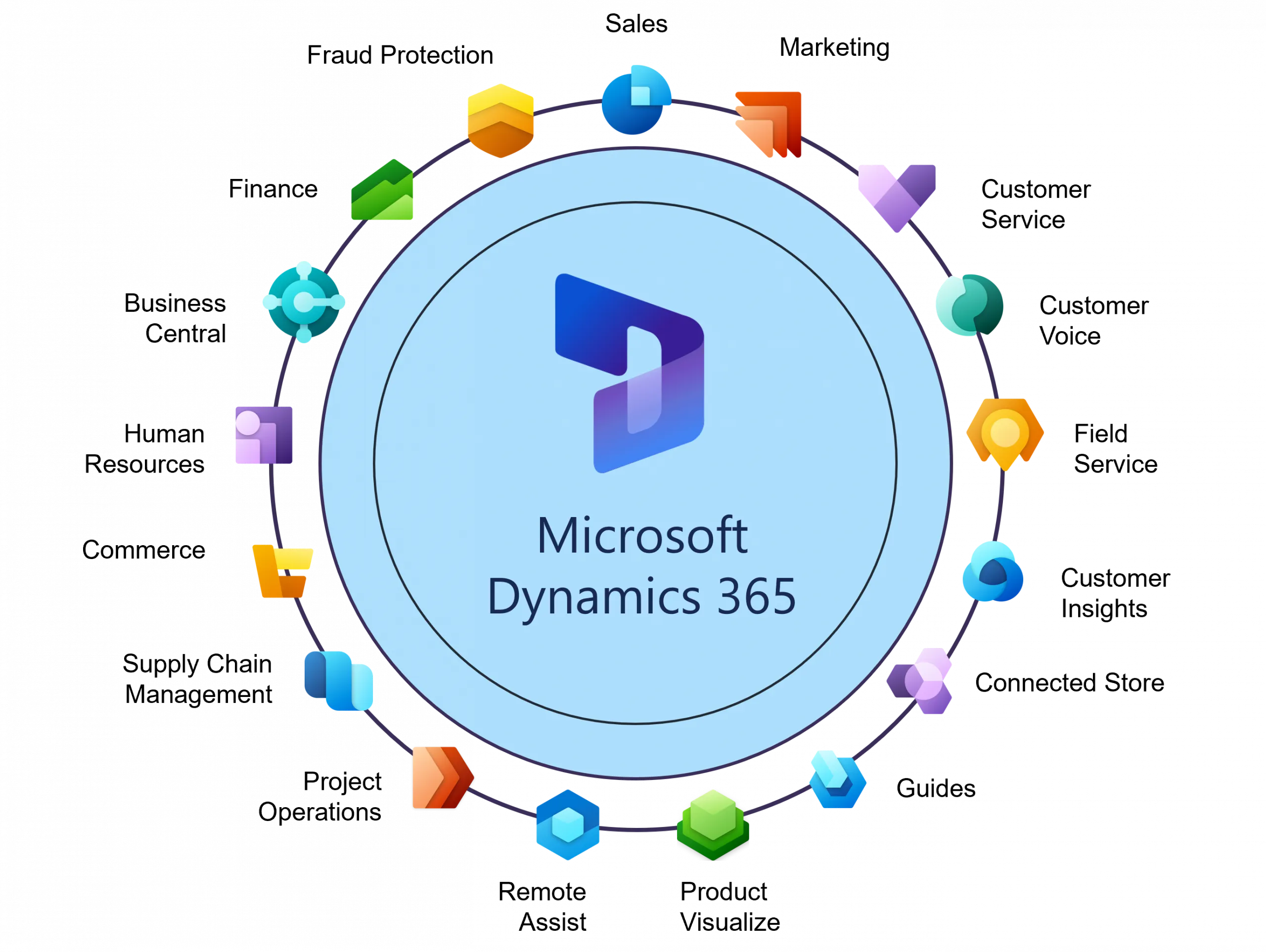Since the first version of Microsoft Dynamics 365, it’s still held the top position of ERP and CRM systems in the ever-changing digital landscape. In this article, we would like to see its overview, including modules, prices, the history of the journey, and the challenges and solutions to improve growth.
What is Microsoft Dynamics 365?

Microsoft Dynamics 365 is a portfolio of Dynamics 365 CRM and ERP applications in the cloud that support businesses in managing effective operations. Moreover, it also integrates with data analytics, AI, and various apps, such as eCommerce, accounting, or another CRM or ERP, creating a comprehensive solution for businesses.
How Microsoft Dynamics 365 works and who uses it?
Microsoft integrates CRM and ERP functions into a comprehensive solution, allowing all-sized businesses in various industries to tailor their specific needs, such as retail, manufacturing, healthcare, financial services, automotive, real estate, technology, and software. Using Dynamics 365 tools can help your business optimize operations and improve customer engagement in today’s digital transformation.
History of Microsoft Dynamics 365
Microsoft has invested in and innovated various versions to meet business demands. Dynamics 365 has been the level-up of Microsoft Dynamics since 2016, and now it continues to improve different features based on market changes.
Originally, Microsoft offered Dynamics ERP (which includes AX, GP, NAV, and SL) and Dynamics CRM and only worked on the premise to solve some basic requirements. Based on the growth of the market, Microsoft launched the portfolio of Dynamics 365, which includes:
- 2016:
- Microsoft Dynamics Ax migrated to Dynamics 365 F&O and separated to Dynamics 365 Finance and Dynamics 365 Supply Chain Management
- Microsoft Dynamics CRM is separated into Dynamics 365 Customer Service, Dynamics 365 Sales, and Dynamics 365 Field Service
- 2018: Microsoft Dynamics NAV is involved in Dynamics 365 Business Central
- 2020: Microsoft Dynamics 365 Field Service transitioned to Dynamics 365 Field Operations
Besides, Microsoft also released more CRM and ERP applications in the Dynamics 365 series:
- 2016: Microsoft Dynamics 365 Field Service; Dynamics 365 Intelligent Order Management
- 2018: Microsoft Dynamics 365 Marketing
- 2019: Microsoft Dynamics 365 Fraud Protection
- 2020: Microsoft Dynamics 365 Commerce (upgraded from Dynamics 365 for Retails)
What is the Microsoft Dynamics 365 market share?
Dynamics 365 ERP
According to Statista, in September 2023, Microsoft Dynamics 365 ERP had over 11% of the global ERP software market, which contributed to a total ERP of $183 billion in 2024. Microsoft Dynamics 365 ERP’s primary growth regions are in North America and the Asia-Pacific.
Microsoft Dynamics 365 ERP is adopted in various industries with its integration between CRM and ERP. However, SAP, Oracle, or Salesforce are also competitors that dominate in various segments due to their financial applications, which is a significant part of the overall ERP market.
Dynamics 365 CRM
As of 2023, Microsoft Dynamics dominates approximately 5.3% of the global CRM market, whose total value globally will reach $157.6 billion in 2030. Microsoft Dynamics 365 CRM primary growth regions are in the US, UK, Switzerland, Germany, and more.
Dynamics 365 CRM is considered a robust solution for organizations looking for advanced CRM capabilities with deep data analytics. Moreover, it also integrates AI-driven insight into Dynamics 365 Sales and Customer Service modules.
The Modules in Microsoft Dynamics 365

Dynamics 365 includes a series of modules, each catering to specific business functions, to streamline and improve various aspects of CRM. It includes sales, marketing, customer service, and field service to support deeper customer relationships, enhance operational efficiency, and increase revenue. Users can use it independently or in conjunction with one another, providing flexibility and scalability to businesses.
Microsoft Dynamics 365 CRM modules
Microsoft Dynamics 365 CRM is a flexible business solution that offers various modules, improving customer relationship management.
| Dynamics 365 Sales | It supports businesses in streamlining their sales operations, managing leads, and closing deals more effectively. |
| Dynamics 365 Marketing | It includes tools for marketing automation, campaign management, and customer journey monitoring, which will help you improve your marketing efforts and customer engagement. |
| Dynamics 365 Customer Service | It is designed to improve customer support and service and includes tools for case management, service automation, and customer analytics. |
| Dynamics 365 Field Service | Enhances on-site customer service by optimizing field service operations through scheduling, dispatch, and service agreement management. |
The users can benefit from Dynamics 365 CRM modules to improve their operations and customer experiences:
- Understanding customer insight, behavior, or trends based on analytics and reporting functions allows organizations to capture all effective marketing and sales strategies.
- Improving customer satisfaction and loyalty through marketing automation, customer interaction management, and providing personalized experiences through multiple channels.
- Tracking leads, managing contacts, or winning deals smoothly by integrating with Office 365 and Outlook.
- Getting a 360-degree customer overview by unifying data from marketing, sales, and customer interactions.
- Managing and accessing remote data through cloud-based Dynamics 365.
Microsoft Dynamics 365 ERP modules
Microsoft Dynamics 365 ERP is a comprehensive business solution that automates and integrates numerous areas of organizational operations.
| Dynamics 365 Finance | Streamlines financial procedures while providing insights into corporate performance and financial planning. |
| Dynamics 365 Project Operations | Improves project outcomes by combining project management with financial and resource management. |
| Dynamics 365 Business Central | A comprehensive ERP system for small and medium-sized organizations that covers finance, operations, sales, and customer care. |
| Dynamics 365 Supply Chain Management | Optimizes supply chain activities, inventory management, and production planning to increase operational efficiency. |
| Dynamics 365 Intelligent Order Management | Uses AI to automate and optimize order fulfillment, ensuring timely and precise delivery. |
| Dynamics 365 Commerce | Integrates back-office, in-store, and digital experiences to provide a full retail solution for both online and physical businesses. |
| Dynamics 365 Fraud Protection | Uses AI to assist in preventing fraudulent activity and improving security and trust. |
Dynamics 365 ERP modules are designed to streamline core operations and allow for better data-driven decision-making.
- Integrating core business operations into a unified platform, such as sales, customer services, finance, etc., to ensure seamless information management through different departments.
- Managing business finances more effectively with real-time financial management functions, such as analytics, budget control, and financial reporting,.
- Streamlining supply chain operations to improve fulfillment rates and enhance supplier relationships.
- Providing various tools to set up process plans from plan to produce in manufacturing industries.
Microsoft Dynamics 365 with Power Platform and AI
Dynamics 365 seamlessly works with its power platform, which can be considered a toolbox for extending and customizing Dynamics 365 capabilities. The Power platform offers various tools, such as Power Apps, Power BI, Power Pages, Power Automate, and Power Virtual Agent, to build workflows, automate tasks, and create data visualization. Operating with MS Dynamics 365 allows users to tailor specific needs and processes.
Besides, MS Dynamics 365 incorporates machine learning and artificial intelligence to offer a range of intelligent features, such as AI in Dynamics Sales, which helps sales teams optimize processes for customer interaction improvement, or AI-chat bots in Dynamic Service, which can improve potential customer service. Overall, the AI-driven capabilities allow businesses to make better decisions and free up boring daily tasks to focus resources on the core process through valuable insight.
Microsoft Dynamics 365 pricing
First of all, your business needs to discover the license cost, including the level of services, team members, or add-ons.
- Service level: Many Dynamics 365 apps offer different levels, such as basic, standard, or premium, with different features and functionalities.
- Team members: it includes full users (who have a full range of functionalities) and additional users (who need limited access to the systems).
- Add-ons: It has a wide range of costs for binding multiple applications.
Besides, depending on the Dynamics 365 application, it will have a different range of prices. Let’s take a look at the following table:
Unit: user/month
| Dynamics 365 Sales | Professional: $65Enterprise: $95Premium: $135Relationship Sales: $162Copilot: $40 |
| Dynamics 365 Marketing | Base: $1,500Attach: $750Additional Contacts & Interactions: $250 |
| Dynamics 365 Customer Service | Professional: $50Enterprise: $95 |
| Dynamics 365 Field Service | Basic: $95Contractor: $50 |
| Dynamics 365 Finance | $180 |
| Dynamics 365 Project Operations | $120 |
| Dynamics 365 Business Central | Essentials: $70Premium: $100Team members: $8 |
| Dynamics 365 Supply Chain Management | $180 |
| Dynamics 365 Intelligent Order Management | $300 per 1,000 orders lines/month |
| Dynamics 365 Commerce | Basic: $180Add-in: $4,000/month |
| Dynamics 365 Fraud Protection | $12 |
Is Microsoft Dynamics 365 pricing expensive?
Microsoft Dynamics 365 is considered the leading CRM and ERP solution in the market. However, its prices seem more expensive than other systems, making it difficult for small and medium businesses to afford it. For example, it limits the number of users, offers limited free features, and has various additional costs.
But depending on your business requirements, you can only choose some from the Dynamics 365 application series. Then, you can connect and sync data between Dynamics 365 and other systems, creating a streamlined and unified business operation.
Dynamics 365 challenges and solutions
Implementing Dynamics 365 presents challenges such as complex implementation processes, integration difficulties with current systems (legacy systems), and potential resistance from users accustomed to older systems. Balancing the level of customization to meet specific business needs is also a hurdle. The need for specialized training, especially for smaller businesses with limited resources, and the overall cost considerations further contribute to the challenges associated with Dynamics 365 implementation.
To address challenges in implementing Dynamics 365, it is essential to adopt a structured approach. Begin with a well-defined implementation plan, incorporating stakeholder input, and a phased rollout strategy. Besides, working with integration experts who have experience in Dynamics 365 and others for data synchronization support. Let’s check Microsoft Integration on App Source to know which platform can connect with Dynamics. Moreover, your businesses should prioritize user training to adopt new technologies or improve productivity.
How to access Microsoft Dynamics 365?
All of the fundamental knowledge regarding Microsoft Dynamics 365 we’ve discovered. If it’s possible, let’s try it. I highly recommend it to you. Before accessing Dynamics 365, you need to purchase the license. Let’s visit Dynamics Pricing for details, or you can scroll up our before section.
Step-by-step to sign into Microsoft Dynamics 365 as an administrator:
- Step 1: Login into the admin center (admin.microsoft.com), then set up your Dynamics 365.
- Assign the licenses: User → Active users; select the users and add product licenses.
- Access the Dynamics 365 home page to choose the app you want to use.
Besides, users also have access to Microsoft Dynamics 365 by app from the Apple Store or Google Play Store. Let’s log in with your credentials to access your Dynamics 365 data and functions on the go.
Conclusion
Microsoft Dynamics 365 stands out as a powerful tool for modern businesses, offering a wide range of functionalities to streamline operations and drive growth. Its continuous evolution and integration with the latest technologies make it an essential asset for companies looking to stay competitive in a rapidly changing business environment.
We hope you can get some valuable information from this article. If you have any questions about integrating Dynamics 365 with other business systems, feel free to contact us.